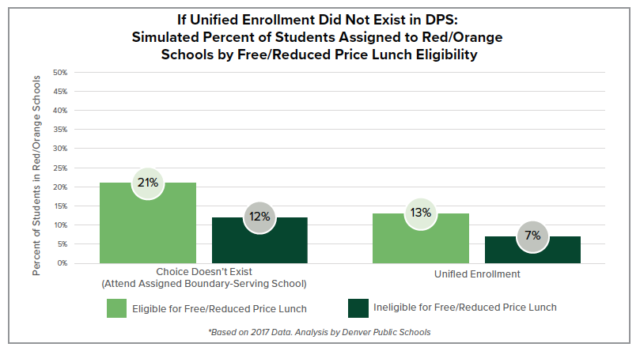 Education news doesn’t appear to be taking a break anytime soon with less than 2 months before students head out for their own summer break. This April, A+ Colorado delivers to your inbox: a new report on Denver’s unified enrollment system: SchoolChoice, an Arts Education Forum, a coalition’s call for measuring quality in Denver, two thought pieces from #EdColo leaders and plenty more.
Education news doesn’t appear to be taking a break anytime soon with less than 2 months before students head out for their own summer break. This April, A+ Colorado delivers to your inbox: a new report on Denver’s unified enrollment system: SchoolChoice, an Arts Education Forum, a coalition’s call for measuring quality in Denver, two thought pieces from #EdColo leaders and plenty more.
A+ Updates
Is Denver a School Choice Model? 
Prior to 2012 when Denver Public Schools (DPS) became one of the first of two school districts in the country to shift to a unified enrollment system with their launch of SchoolChoice, 46% of DPS students were attending a school other than their neighborhood boundary-serving school.
A+ Colorado has just released School Choice With Unified Enrollment, the third brief from Denver’s Next Journey, a multi-part series offering a look into:
- enrollment in Denver before 2012,
- the process to create unified enrollment,
- the strategies that have been implemented since the launch,
- and how unified enrollment has changed the educational experience for families and students.
School Choice With Unified Enrollment finds that since the launch of SchoolChoice, the number of students using the unified enrollment system has remained fairly consistent, with the number of participants reaching a record high in 2018-19. Additionally, we still find gaps by income, race, and ethnicity in participation, but the gaps are far smaller than under the previous system.
This brief addresses that unified enrollment does not fully solve a highly inequitable system where more affluent students are still more likely to access the city’s highest performing schools. There are still key questions that lay ahead for Denver as it supports more students accessing a school that meets their needs. Read the full brief here.
The next brief in Denver’s Next Journey will be released in early May focusing on Denver’s School Performance Framework (SPF). A+ Colorado will host an educational event in early June inviting educators, community members, activists, and families to participate in the conversation in order to continue to improve community engagement within Denver Public Schools.
The Impact of Arts Education in Colorado
This month, Colorado’s Governor Jared Polis welcomed a room full of over 100 arts education enthusiasts and experts for the first-ever Arts Education For All Forum, hosted by A+ Colorado, Denver’s Arts and Venue, and Colorado Business Committee for the Arts. This forum allowed for a discussion on arts education while learning from local, state and national experts on the impact and importance of arts education and how students in Colorado are being served, with an emphasis on research to measure the impact of art education and how this can inform practice.
Many respondents shared that the information they received at the forum was resourceful and would be used throughout their practice which includes: networking, teaching, discussions with funders, working with students and families, and developing programs for students.
In 2016, A+ Colorado released A Retrospective on Arts Education in Denver, exploring steps the district has taken to make high quality arts education more accessible to more students. A+ Colorado is committed to advocate on behalf of arts being a critical component of a quality education for students.
News to Share
Coalition Calls for Community Discussion on Measuring School Quality
Last week, A+ Colorado joined a group of 11 other diverse organizations from across Denver who represent community institutions, students, families, school leaders and teachers, to send Denver Public Schools (DPS) a letter calling for a community discussion on how to measure school quality in Denver.
The letter asks DPS to commit to engaging communities in robust conversations about how Denver measures school quality and builds new ways to support understanding of school performance. The letter states the importance of having these conversations anchored in the community and not far away at the state level. It is essential that any changes with measuring school quality are in public view so that trust can be built into any approach. Most importantly, a community conversation can help create a collective vision for how to address the deep inequities in the school system. A+ will continue to report back to our readers on progress on these important conversations between community groups and DPS.
Stumbling through Accountability in Adams 14
The Adams 14 School Board and community head back to the drawing board after the State Board of Education (SBE) rejected the proposal that Mapleton School District would serve as an Education Management Organization (EMO) to support Adams 14’s turnaround efforts. The SBE also expressed concern that the proposal from MGT/UVA, Adams 14’s second choice, would not meet the requirements of the State Board’s order from December. This leaves Adams 14 in a precarious position: there is no identified external partner to plan and implement a district-wide turnaround strategy; the current Superintendent Dr. Abrego has been released from day-to-day responsibilities; the Board is in the process of appointing another member to their ranks after Dr. Bill Hyde resigned earlier this spring. There are big questions about how the district will move forward, and an even bigger fear that this turmoil means there is little hope of real changes for students in the next school year.
The experience of Adams 14 has exposed gaps in Colorado’s accountability system. We hope our state grapples with how we support local communities to develop and implement system-wide improvement and turnaround plans when the need is so great, and students depend on it.
The Importance of a Principal
We know that great school principals are critical in the development and improvement of an effective school. Principals set the direction, build the culture and lead school faculties. Effective principals are essential to any school improvement effort. The Rand Corporation released a report last week on 6 large urban school districts’ efforts to create their own principal pipelines to better serve students. The report included research on Denver that showed a significant improvement in achievement for principals brought through these efforts, a reduction in principal turnover while showing that this work is affordable (costs of less than $50/student per year).
One of the former leaders of the Denver principal pipeline, now principal of East High School, John Younquist calls on Denver Public Schools to examine why high school principal turnover is so high and what might be done to better support secondary principals. Read Where Have All the Principals Gone? A Principaled Perspective by John Youngquist.
Is Love the Silver Bullet?
Christine DeLeon, the CEO and Founder of Moonshot edVentures, has dedicated her life to making a difference in the world by narrowing the ever-growing achievement gap between our white students and students of color.
Christine shares her experiences as a woman of color, and how other impactful women throughout her life have shaped her view on the silver bullet to change the game for students; and that is love. Read Christine’s piece here.
State Board Asks Aurora to Reconsider
The State Board of Education voted to return the decision to close Vega Collegiate Charter to the Aurora Board of Education, asking the district to reconsider its decision to close the charter school at the end of this year for failing to meet the education requirements of its special education students. The unanimous vote by State Board members was a strong rebuke to the district for a decision that seemed extreme to many supporters of Vega.
The school and district officials disagree over the handling of special education students at the school, with the district claiming that missteps by school staff were intentional and violated the contract the charter has with Aurora Public Schools, forcing its termination. School staff and board members of the school argue that they have acted in good faith to rectify the mistakes made with their special education students and closure was unnecessary. The APS school board will have a month to make a decision. If they proceed with closure, the decision can go to the State Board one more time if Vega chooses to appeal.
State Board members highlighted the academic achievements of Vega as an important consideration in keeping the school open. Students at Vega posted the highest growth percentile in Math in the state last year and had the highest growth in the district in Elementary and Middle School ELA and Math for several student groups. It was noted that the school far outperforms the other school choices in Northwest Aurora where the charter is located.
New Rules for Accountability
The State Board of Education will start to revise and replace the rules that make up and govern the state’s accountability system beginning in June. These rules have implications for how the state identifies and supports schools, as well as how the state publicly communicates important information about schools and districts. A lot will be on the table including:
- How metrics (in particular, how growth to standard or “on-track” growth) are calculated and how those metrics come together in an overall school or district rating;
- The process by which accreditation and performance ratings are assigned and how schools and districts can appeal their ratings;
- The process for schools and districts on year 5 of the accountability clock who are facing state intervention due to chronic low performance;
- Reporting of non-accountability data including the addition of health education, concurrent enrollment, school library programming, credit recovery, and financial information.
A+ will be following and providing updates as decisions get closer.
A+ Answers
Denver resident and community member, Mike Galvin submitted a question to A+ Answers. Mike asked, “DPS long term improvement trends appear to correlate with the gentrification of Denver neighborhoods. Have you controlled for demographic (economic class) change in any of your studies of schools that have improved, or for the overall change in DPS achievement?”
This is a key issue that Denver will need to continue to grapple with over the coming year as gentrification trends continue and accelerate. This question is very difficult to answer because it involves linking data from different sources which we cannot do easily. This is because as an organization we do not have access to student-level information which would be the best way to control for demographic change in a neighborhood. That information would need to be linked to Census data on neighborhood demographics. Mapping one dataset to the other to answer this question is unfortunately beyond our capacity at the moment.
Shift Research Lab has looked at some of the demographic trends in Denver which you can explore here. The first brief in our Denver’s Next Journey series looks at some of the enrollment trends district-wide (p.5) as well as some achievement changes over time by different demographic groups (p.7). However, as the question identifies, these are correlations, and determining the causal impact of demographics on achievement is a much more complicated question to answer with the data currently available to the public. We will continue to seek out creative ways to control for demographics in our work in the future to try to better understand the impact that changes in our community are having on changes in our schools.
Ask The Next A+ Answers. Get in contact with us!
 Student Spotlight: Edwina Maben: Singer, Songwriter and Aspiring Producer
Student Spotlight: Edwina Maben: Singer, Songwriter and Aspiring Producer
Edwina Maben is a participant in Youth on Record’s FEMpowered. A+ Colorado was pleased to co-host the Arts Education for All Forum where Edwina performed and shared her story.
Songwriting has given me the ability to let certain chapters of my life live forever. Particularly in my high school years, I discovered the healing properties of music in my life. I wrote songs about my first few weeks at my new high school, the pain of missing old friends and places, and the the feeling of not knowing why this was happening to me. I lived with a lot of anxiety and anger in the events I couldn’t control at the time, and those feelings lived in my lyrics.
A+ in the News
Calls are mounting to change Denver’s school rating system. Here’s how it works now., Chalkbeat
Proposed Aurora school chartering course toward minorities in performing arts at a haven safe from racism, Aurora Sentinel
Here’s how many students were accepted and waitlisted at each Denver school, Chalkbeat
Upcoming Events
Want A+ Colorado news delivered to your inbox? Subscribe!